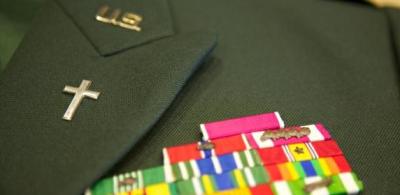US Defense Department Censoring Opposition to Military's Gay Policy?
The public's perception of the military since the repeal of "Don't ask, don't tell" (DADT) less than a year ago is being manipulated by the U.S. Department of Defense, says the director of a chaplain alliance group.

The military department is censoring opposing views to portray a trouble-free time after the repeal of the policy that barred openly gay, lesbian, or bisexual persons from the military for nearly 18 years, according to Chaplain (Col.) Ron Crews, executive director for the Chaplain Alliance for Religious Liberty. Also, chaplains working with commanders to diffuse problems are another reason for the relative calm.
"Part of the impression that is now in the public has been caused by the Department of the Defense refusal to allow chaplains and other service members who have expressed problems with this repeal," Crews, USAR retired, told The Christian Post. "They have denied them the opportunity to speak openly about these problems while at the same time, Department of the Defense officials are highlighting how this repeal has benefitted soldiers and military personnel who engage in homosexuality."
A recent Associated Press article told the story of a Southern Baptist Air Force chaplain attending the "civil union ceremony" between two males that was officiated by a female chaplain at McGuire Air Force Base chapel. The Southern Baptist chaplain, who said he would not perform such a ceremony, attended the event in support of his fellow servicemen and the chaplain.
The story was given as an example to show that the end of the 'don't ask' ban on gays "hasn't fueled the turmoil that outsiders feared," a presumption that the AP reporter supported with other quotes throughout the article. Crews said he disagrees with that assumption.
"If you express difficulties as a chaplain you are specifically ordered by your commanders that you do not speak to the press about your concerns about the repeal process," he said. "I think there is a double standard. If you are in favor of the repeal and how things are going you can speak publicly about it. If you have problems with it you cannot speak publicly about it."
It is still too early to tell whether the repeal of DADT will work in the military, Crews insists. He is frustrated that the other side of the story has not been fully told.
"To say the dust has settled would be premature," Air Force Col. Gary Linsky, a Roman Catholic priest who leads 50 chaplains, told AP. "But I've received no complaints from chaplains raising concerns that their ministries were in any way conflicted or constrained."
Crews said that it is true that there have been minimal problems to date, "but the jury is still out on how this policy will impact the ministry of chaplains long term, particularly those that hold biblical views on homosexuality."
He adds, "We're still in the relatively early stages of this and we still don't know the long term impact that this policy change is going to make on recruiting and retention of our defense forces, not to mention the chaplain input."
Crews said that he has been talking to several evangelical chaplains for their perspective of a "new environment" in the military that just last month celebrated Gay Pride for the first time.
"There have been some problems. There are still some issues that have not yet risen to the surface yet," he said. Those include the scenario of a chaplain who decides not to share a religious service with a homosexual chaplain.
Crews poses several questions including, "What will the senior chaplain authorities do when that occurs? Will that impact chaplains who hold biblical views concerning homosexuality? Will this become recruiting criteria in the future?"
He said that he has already witnessed preferential chaplain requests for military functions that include the need for chaplains of a certain faith group, "meaning a faith group that supports the homosexual policy."
In general, the mass media has not reported on these issues, in part because of the damage control from both chaplains and commanders, according to Crews.
"I've come to the conclusion that we have been doing our job really well in terms of trying to diffuse potential problems by working with chaplains and commanders at the lowest level," he said. "Many of us have been involved in negotiating some situations with our chaplains and commanders with the understanding that we are all focused on serving our military community with grace and dignity in doing what is right for the soldiers, marines, airmen, and reserves."





























